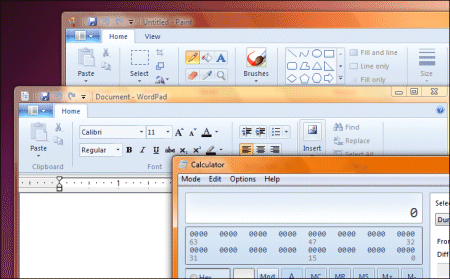Here at PDC in Los Angeles, Microsoft’s Chief Architect Ray Ozzie and Windows VP Steven Sinofsky are introducing Windows 7. A couple of days ago, journalists were loaned Windows 7 laptops to try and I’ve been using this over the last day or so. Generally it’s been a pleasure; performance is great and it works well, aside from Internet Explorer 8 going into an occasional sulk.

A question though: does it merit a new major version number, or is this really a big Vista service pack? It’s a bit of both. Under the hood Windows 7 reports itself as version 6.1 (Vista is 6), and that’s about right.
I see Windows 7 as a reaction to Vista’s problems. Vista was too different from XP; Windows 7 makes small, generally pleasant but evolutionary changes. Vista was too incompatible; Windows 7 uses the same core architecture and pretty much everything that worked on Vista will also work here. Vista was too demanding on hardware; Windows 7 is said to perform better on the same hardware, and while I haven’t had a chance to make the comparison, I can well believe it. Vista won a reputation for prompting the user too much with User Access Control security dialogs and others; Windows 7 is designed to be “quieter” and UAC has been tamed.
The build I have been trying is not feature-complete, and I am sure it will look, cosmetically, more different from Vista in its final release. Nevertheless, the points above are stated goals. The business world will greet Windows 7 with relief, and consumers will, I suspect, enjoy this release – but don’t expect anything revolutionary.
My reflection: if Vista had not been disrupted by the false WPF-based trail shown at PDC 2003 but later abandoned, and also disrupted by Microsoft’s security push which saw the Windows team focusing for a period on XP SP2 rather than Vista, then Vista itself might have most of what is now coming in Windows 7.
That said, if you are a Windows user you are going to like this release.
Does that brownish/orange look like Ubuntu too anyone!!!
If Windows 7 has more or less the same resource requirements as XP that would be great!
Gary
“Vista was too incompatible; Windows 7 uses the same core architecture and pretty much everything that worked on Vista will also work here.”
Wasn’t the problem that Vista was too incompatible with *XP*. Surely what we need is something that is more compatible with XP, not Vista. I continue to use XP even though I have Vista just because of the stuff that won’t work. I was just spending too much time fiddling around trying to get things to work with Vista.
@George
I agree to some extent; but do you really want apps that write data to program files, for example, to work like that on Windows 7? Most app vendors have learned to cope with Vista now.
Tim